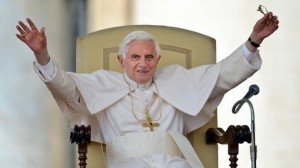Benedict XVI, Defender of Life and Family
Carlos Beltramo also contributed to this article.
 Some thought that Benedict XVI, already old when elected, would be merely a transitional figure, a caretaker who would serve for a few years and then hand over the Church that he inherited from the Blessed John Paul II to a younger man. But neither the Church nor the Pope have been in a holding pattern over the last eight years.
Some thought that Benedict XVI, already old when elected, would be merely a transitional figure, a caretaker who would serve for a few years and then hand over the Church that he inherited from the Blessed John Paul II to a younger man. But neither the Church nor the Pope have been in a holding pattern over the last eight years.
John Paul the Great cast so long a shadow that his successor ran the risk of being hopelessly diminished by comparison. This did not happen to Benedict XVI. A close friend and confidant of the former Pope, he provided continuity in doctrine, but also leaves behind the imprint of his own calmer, more intellectual style. If John Paul II seemed like an army marching into battle, Benedict XVI seems more like an intelligence service, carefully and thoughtfully collecting and analyzing information.
In this way Benedict XVI has served as a true “bridge-builder”—the original meaning of the Latin Pontifex. The next Pope, whom we will have in a few weeks time, will find support and encouragement in the figures of both of his predecessors, but their styles will not pressure him. Inspired by the Holy Spirit, he will be free to develop his own unique style.
The bridge-builder metaphor holds in another way as well, because Benedict XVI has left a solid structure of orthodoxy for future popes to cross the heresies of this age. Here we can mention his penetrating critique of relativism in his speech at Westminster Abbey in 2010, his tireless efforts to maintain the liturgical traditions of the Church, and his relentless struggle against the homosexual pedophiles who have infiltrated it.
Throughout all of this he was constantly attacked and his words distorted by those who reject the notion of absolute truth and would trivialize human life. Witness the response to his lecture at the University of Regensburg, in which his words in favor of peace between Christians and Muslims were taken out of context and used in an effort to fuel controversy.
We at PRI will most remember his stalwart defence of human life, and his call for all of us to be involved in public life. People of faith should be active in the public square, he said. There they should defend religious liberty, the natural family, and life itself from conception to natural death. These principles are nonnegotiable, he reminded us, and cannot be relativized.
Benedict XVI spoke clearly and firmly in defense of the natural family, consisting of a father and the mother and their natural and adopted children. He knew he would be viciously attacked by those who seek to redefine the family beyond all recognition, but this did not deter him. At the end of last year he told the Cardinals and personnel who work in Rome that “the attack we are currently experiencing on the true structure of the family, made up of father, mother, and child, goes much deeper. (…) it is now becoming clear that the very notion of being – of what being human really means – is being called into question.”
He also addressed, in a very profound way, another question that we at the Population Research Institute are particularly engaged in namely, the relationship between true development and respect for Life and Family. In his encyclical Caritas in Veritate he said: “The notion of rights and duties in development must also take account of the problems associated with population growth. This is a very important aspect of authentic development, since it concerns the inalienable values of life and the family. To consider population increase as the primary cause of underdevelopment is mistaken, even from an economic point of view. Suffice it to consider, on the one hand, the significant reduction in infant mortality and the rise in average life expectancy found in economically developed countries, and on the other hand, the signs of crisis observable in societies that are registering an alarming decline in their birth rate.”
The Left is taking advantage of Benedict XVI’s resignation to attack him and the Church in general. They should be ignored. Those who reject the existence of absolute Truth, who sacrifice human life on the altar of abortion, and who do not understand that love is the most powerful force in the universe, will ever find reasons to hate those who espouse and defend such truths.
Within the Church there are those who say that the Pope has “stepped down from the cross.” We do not accept this view. Rather, we believe that in stepping down he has embraced the cross more firmly than we can imagine. This came through in his general audience of 13 February, during which he said “I have felt, almost physically, in these days which are not easy for me, the strength which the love of the Church and your prayers bring to me.”
One thing is certain. In a few weeks white smoke will issue from the chimney of the Sistine Chapel and the world will witness Catholics say, for the 266th time, “Habemus Papam.” We have a pope.

